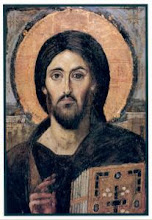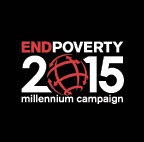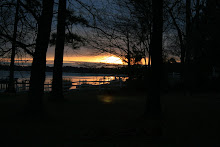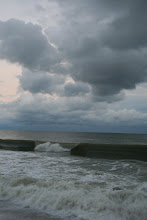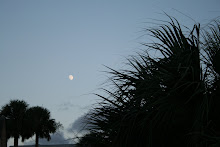Friday, November 28, 2008
Thanksgiving Day Peachtree Rd Turkey Bowl Shootout
Thanksgiving is a day of gratitude, eating, and the gathering of family and dear friends. It is a time we come together in love (along with all of the family dysfunction) to visit and reconnect with one another. My mother’s house, fondly known and called by my children as “Grammy’s” is no different. We have plenty of delicious food around the table, yet over the years the number of hungry little mouths has substantially increased. With the added number of grandchildren and friends there has emerged over the years yet another West tradition; laying the good food aside, the West family Thanksgiving transforms into the site of the annual Peachtree Road Turkey Bowl Shootout. Yes, football takes over! Bodies of all shapes and sizes fly around the front yard. There is much love, fun, laughter and of course, arguing with each other. It is a time of family fellowship, bragging rights (at least for the next year) and an opportunity to work off at least a little of the Thanksgiving feast.
Thursday, November 27, 2008
Wednesday, November 26, 2008
World Hunger and U.S. Aid
Following is a teaser for a feature to run on Religion & Ethics Newsweekly this weekend. You can find airtimes at:
http://www.pbs.org/wnet/religionandethics/
According to a new report from the Christian anti-hunger group, Bread for the World Institute, the number of people living in extreme poverty has increased by 100 million in less than two years, while the number of hungry people has grown by more than 75 million. The report said the world is facing a hunger challenge unlike anything seen in the past 50 years, and called on Congress and the new Administration to revamp U.S. foreign assistance in order to more effectively reduce global poverty and hunger.
Kim Lawton is joined by Reverend David Beckmann, president of Bread for the World Institute, for a studio discussion focusing on the global food crisis and what reforms the U.S. needs to make to provide adequate help to developing countries. "We did a poll of voters on Election Day and 70 percent of American voters said they would like our government to spend more money to deal with the global hunger crisis. I think people know it’s the right thing to do," Rev. Beckmann observes. "I think we also know it’s not smart to neglect misery in far-off places. And we’ve seen how the whole global economy is interconnected. So it’s good for our economy to pay attention to the global dimensions of development." (New) --~--~---------~--~----~------------~-------~--~----~
This message is sent out courtesy of the Google Groups "E4GR" group.
To post to this group, send email to E4GR@googlegroups.com http://groups.google.com/group/E4GR?hl=en
Visit the EGR website for all your MDG needs -- http://www.e4gr.org/
http://www.pbs.org/wnet/religionandethics/
According to a new report from the Christian anti-hunger group, Bread for the World Institute, the number of people living in extreme poverty has increased by 100 million in less than two years, while the number of hungry people has grown by more than 75 million. The report said the world is facing a hunger challenge unlike anything seen in the past 50 years, and called on Congress and the new Administration to revamp U.S. foreign assistance in order to more effectively reduce global poverty and hunger.
Kim Lawton is joined by Reverend David Beckmann, president of Bread for the World Institute, for a studio discussion focusing on the global food crisis and what reforms the U.S. needs to make to provide adequate help to developing countries. "We did a poll of voters on Election Day and 70 percent of American voters said they would like our government to spend more money to deal with the global hunger crisis. I think people know it’s the right thing to do," Rev. Beckmann observes. "I think we also know it’s not smart to neglect misery in far-off places. And we’ve seen how the whole global economy is interconnected. So it’s good for our economy to pay attention to the global dimensions of development." (New) --~--~---------~--~----~------------~-------~--~----~
This message is sent out courtesy of the Google Groups "E4GR" group.
To post to this group, send email to E4GR@googlegroups.com http://groups.google.com/group/E4GR?hl=en
Visit the EGR website for all your MDG needs -- http://www.e4gr.org/
Tuesday, November 25, 2008
The Beauty of the Liturgical Season of Advent
The liturgical season of Advent is my absolute favorite time of year. It brings back wonderful memories of growing up in my home parish, Good Shepherd Episcopal Church, Augusta, Georgia. I loved that youthful time of innocent wonder and anticipation (probably more of Santa than the birth Jesus in those days). However, there was still a mystery that surrounded those often cold and bluish, purple days of Advent. A mystical cloud of anticipation hung over the church and the old brick parish hall.
The influence of the church with its beautiful Advent music, Advent wreath along with the chill in the air had a profound impact on my early spiritual formation. Even today I still sing from my heart all the rich Advent hymns and Anthems that we learned in Good Shepherd's Junior/Children's Choir. "O Come, O Come Emmanuel," along with the Charles Wesley hymn, "Lo He Comes with Clouds Descending" are both ever present tunes, readily perched on my lips.
As a visual artist I am drawn to the rich darkness and highlights of piercing light that is associated with Advent. There is also a feel and presence in the church that is different from any other time of the year. Advent is a season in which fear and joy collide giving birth to peace; might and humility melt into one another; light and darkness bind together and form an incredible holiness. In other words, "The Lion and the Lamb (opposites) lay down beside one another," and there is a quiet and transorming peacful hush that falls across the landscape of God's creation.
I wish each of you a most happy and blessed Advent Season, and hope that you too may find its mystery attractive and meaningful.
The influence of the church with its beautiful Advent music, Advent wreath along with the chill in the air had a profound impact on my early spiritual formation. Even today I still sing from my heart all the rich Advent hymns and Anthems that we learned in Good Shepherd's Junior/Children's Choir. "O Come, O Come Emmanuel," along with the Charles Wesley hymn, "Lo He Comes with Clouds Descending" are both ever present tunes, readily perched on my lips.
As a visual artist I am drawn to the rich darkness and highlights of piercing light that is associated with Advent. There is also a feel and presence in the church that is different from any other time of the year. Advent is a season in which fear and joy collide giving birth to peace; might and humility melt into one another; light and darkness bind together and form an incredible holiness. In other words, "The Lion and the Lamb (opposites) lay down beside one another," and there is a quiet and transorming peacful hush that falls across the landscape of God's creation.
I wish each of you a most happy and blessed Advent Season, and hope that you too may find its mystery attractive and meaningful.
Saturday, November 22, 2008
A Christ Filled Response to the Global Ecconomic Crisis
In times of crisis very real and tangible fears tend to rise to the surface creating harmful anxiety, stress and worry. Often the unfortunate bi-product of that fear causes us to either withdraw into ourselves, or to lash out at others or iconic institutions. Yet I ask the question, is this difficult economic crisis an opportunity for the church to shine and provide spiritual strength and fortitude for her members, as well as those in search of spiritual substance? My answer to that question is – “Yes, absolutely Yes!” When we read the Bible many times we see the suffering of God’s people. Yet we always see God’s redeeming love and renewal that comes out of the turmoil. As faithful Christians God’s Word leads the way for us in our daily lives, reminding us that God is ever present and hears our cries; God feels our pain; God endures our suffering and fears. God will see us through this desert journey.
The economic distress of our day, while most unpleasant and troubling, presents all faithful Christians with an opportunity to rise up and meet the ever growing dimness of fear and doubt with a renewed faith, a determined zeal and unbending hope. As a priest and servant of Christ, I wish to assist us in navigating these difficult and tumultuous waters, so that we might remain the ever steady and non-anxious presence that brings peace of mind, stability of heart and gentleness of spirit to the rest of the Church and our community. I realize in some ways that this is a monumental task and one that requires deep and genuine spiritual centeredness. But please hear me when I say, “It is not an impossible task.” In his letter to the Philippians, the Apostle Paul wrote
“Rejoice in the Lord always; again I say Rejoice. Let your gentleness be known to everyone. The Lord is near. Do not worry about anything, but in everything by prayer and supplication with thanksgiving let your requests be made known to God. And the peace of God which passes all understanding will guard your hearts and your minds in Christ Jesus….. I (WE) can do all things through him (Christ Jesus) who strengthens me (US).”
We are children of God and created in his image. As Christians we are blessed and equipped for ministry to the world as well as in our own backyard. Since we proclaim Christ as Lord and Savior, this global financial crisis presents us with the chance to claim our place in that life. I understand in this difficult time that we are genuinely afraid; I know we feel insecure, real worry, stress and doubt; and I understand the anxiety sparked by the dark cloud of the unknown. Not many of us freely choose to walk in darkness, but the liturgical season of Advent is an ever present reminder that while the darkness is a natural part of our lives; the light of God will always shine through. In that same terrifying darkness we often unexpectedly stumble onto what we discover is Holy Ground. Through the ages suffering has brought us into the very real presence of God. Therefore I encourage each one of us to steady ourselves in faith and the knowledge of God in Jesus Christ, so that we can set the spiritual example for the rest of the Church and the world. It is more important now than ever that we work together through this difficult and frightening time as a community of faith, bound by our common love in Jesus Christ. As an old friend of mine used to say, “This too shall pass. But in the meantime, (well) its just that – a mean time.” I encourage us to shine like a ligh on a hill and try to set aside (as best that we can) our own fears and doubts, and live our lives as a wholesome example in Christ; setting the spiritual standard and groundedness for others.
In everything we face in this increasingly unstable world it is important to remember that Christ is with us. When we suffer, Christ suffers with us. God is interjecting himself into the very heart of the pain, and working to redeem and reconcile us (and all things) to him. This is the Church’s time to shine through the darkness and become a proactive part of God’s larger plan. And while we may not fully know or understand that plan, we are certain of this: God is with us (Emmanuel) and will never leave us.
Our very wise fore fathers and founders of this country stated, “United we stand, divided we fall.” That statement is a reminder to those who live by faith that we must stand together through thick and thin, united in our diversity by the laying aside of our differences and the casting off of our fear. The burden of the darkness may now weigh heavy upon our shoulders, but the light of hope will cut through that darkness like a sharp razor, revealing God’s ever present self and eternal grace.
Hang in there! Do not give up hope. God has brought us this far and he will not leave us. We are blessed with a strong, faithful and committed church that has the spiritual fortitude and faith to guide and lead us through these murky waters of despair. So let go of whatever it is that holds us back, and let God take over. Together we will make it through this most difficult and uncertain time. That is not a speculation; it is God’s true nature a very real promise.
The economic distress of our day, while most unpleasant and troubling, presents all faithful Christians with an opportunity to rise up and meet the ever growing dimness of fear and doubt with a renewed faith, a determined zeal and unbending hope. As a priest and servant of Christ, I wish to assist us in navigating these difficult and tumultuous waters, so that we might remain the ever steady and non-anxious presence that brings peace of mind, stability of heart and gentleness of spirit to the rest of the Church and our community. I realize in some ways that this is a monumental task and one that requires deep and genuine spiritual centeredness. But please hear me when I say, “It is not an impossible task.” In his letter to the Philippians, the Apostle Paul wrote
“Rejoice in the Lord always; again I say Rejoice. Let your gentleness be known to everyone. The Lord is near. Do not worry about anything, but in everything by prayer and supplication with thanksgiving let your requests be made known to God. And the peace of God which passes all understanding will guard your hearts and your minds in Christ Jesus….. I (WE) can do all things through him (Christ Jesus) who strengthens me (US).”
We are children of God and created in his image. As Christians we are blessed and equipped for ministry to the world as well as in our own backyard. Since we proclaim Christ as Lord and Savior, this global financial crisis presents us with the chance to claim our place in that life. I understand in this difficult time that we are genuinely afraid; I know we feel insecure, real worry, stress and doubt; and I understand the anxiety sparked by the dark cloud of the unknown. Not many of us freely choose to walk in darkness, but the liturgical season of Advent is an ever present reminder that while the darkness is a natural part of our lives; the light of God will always shine through. In that same terrifying darkness we often unexpectedly stumble onto what we discover is Holy Ground. Through the ages suffering has brought us into the very real presence of God. Therefore I encourage each one of us to steady ourselves in faith and the knowledge of God in Jesus Christ, so that we can set the spiritual example for the rest of the Church and the world. It is more important now than ever that we work together through this difficult and frightening time as a community of faith, bound by our common love in Jesus Christ. As an old friend of mine used to say, “This too shall pass. But in the meantime, (well) its just that – a mean time.” I encourage us to shine like a ligh on a hill and try to set aside (as best that we can) our own fears and doubts, and live our lives as a wholesome example in Christ; setting the spiritual standard and groundedness for others.
In everything we face in this increasingly unstable world it is important to remember that Christ is with us. When we suffer, Christ suffers with us. God is interjecting himself into the very heart of the pain, and working to redeem and reconcile us (and all things) to him. This is the Church’s time to shine through the darkness and become a proactive part of God’s larger plan. And while we may not fully know or understand that plan, we are certain of this: God is with us (Emmanuel) and will never leave us.
Our very wise fore fathers and founders of this country stated, “United we stand, divided we fall.” That statement is a reminder to those who live by faith that we must stand together through thick and thin, united in our diversity by the laying aside of our differences and the casting off of our fear. The burden of the darkness may now weigh heavy upon our shoulders, but the light of hope will cut through that darkness like a sharp razor, revealing God’s ever present self and eternal grace.
Hang in there! Do not give up hope. God has brought us this far and he will not leave us. We are blessed with a strong, faithful and committed church that has the spiritual fortitude and faith to guide and lead us through these murky waters of despair. So let go of whatever it is that holds us back, and let God take over. Together we will make it through this most difficult and uncertain time. That is not a speculation; it is God’s true nature a very real promise.
Friday, November 21, 2008
On the Road in Tanzania
The road (if one can call it that) was one of the worst I have ever ridden. The ruts and holes were enough to shake and rattle any vehicle to pieces. Because of the lack of rain and extremely dry conditions, the dust from the dirt road created an impenetrable screen that at times severely impaired our ability to see beyond a few feet in front of us. As we sped along, the car of my good friend and colleague Fr. Yohana Mazaguni sounded as if it would fall apart right there on the road. Interestingly, a little later in the day while standing outside of St. John’s Bible College in the Anglican Diocese of Shinyanga, Tanzania, East Africa, Bishop Charles Ngusa told our small group of Virginia ambassadors (and one Californian) because of the poor road conditions, each Saturday he had a standing appointment with his auto mechanic to get all of the lose screws tightened on his vehicle. What an adventure; just a few days earlier I discovered not only were some of the paved roads as bad as the dirt ones, but saw with my own two eyes the only traffic light in the entire northeastern portion of Tanzania. It was located in the city of Arusha and was apparently not only a novelty for the local inhabitants, but a mystery as well.
The trip to Arusha was an adventure all of its own. The twelve hour bus ride that began at 6am on my first morning in the country was an experience that I shall not soon forget. Many of us are probably familiar with the saying, “He/She went around their elbow to get to their thumb,” (actually there is another more familiar translation of this saying, but believe I’ll pass on that version). We left Dodoma, the capital city of Tanzania on the most patched together and crowed bus that I had been on since peak class time at the University of Georgia. Our destination was to travel north east to the city of Arusha, but not in a conventional or direct way. We actually drove south on one of the few paved roads in the country in order to go north. Ironically it was the same road that we flew over in a charter Missionary Flight Association plane from Dar es Salam to Dodoma in which I prophetically stated out loud to the other passengers – “Boy, I sure am glad we don’t have to drive down that road to get to Dodoma!” God certainly has a sense of humor.
If this sounds strange, believe me, it gets even more bazaar. Realizing in my extreme jet lagged brain that I was not only the sole American aboard the bus, but probably the only blond haired, blued eyed, Caucasian person for miles and miles as well, my sleep deprived system hit an all new high on the anxiety charts. Naturally I didn’t speak Swahili, so I had to rely on Fr. Yohana to tell me what the conversations were about that surrounded me. Apparently, I was a true anomaly in the eyes of the locals. According to Yohana the people on the bus were amazed to see a white American riding the public bus (I was proudly wearing my Georgia Bulldogs baseball cap). Apparently most foreigners rent cars, charter a plane or ride in cabs to their destinations. Naturally at first I had no clue what they were saying; only catching the word “Americana” every so often.
The trip was long, tiring and gave me a true sense of the difficulty the average person faces when it comes to travel in Tanzania. Between the road blocks every ten miles, the bribes given to the policemen at every stop, the crowded bus and beer guzzling passengers (there was a real party beginning to ensue) I witnessed and experienced Tanzania just as the average African does each day. Trust me, it is a challenging lifestyle that tested me to my limit, yet amazingly my African friends smiled, relaxed and took everything in stride.
Tanzania is beyond doubt a third world country in every sense of the word. Things such as electricity, water (yes I did say water) medicine, automobiles and fuel; basic necessities that we often take for granted are actually luxury items for much of the country’s inhabitants. Did I mention water? People in the outlying villages can spend up to 90% of their daylight hours searching for food and water; mainly water. Sadly these same people are often forced to drink from the same well (more like a ditch) that the livestock bath and drink. In some areas the living conditions are so deplorable that disease is a real concern and personal hygiene is simply nonexistent. Electricity is sketchy at best. Many homes do not have service due to either their rural location, or because they simply can’t afford to pay for the service. We drove past one particular village that had no electricity despite the fact that it was located right next to a huge power line grid.
To state the obvious, the infrastructure in Tanzania is weak, corrupt and poorly organized. There is no middle class, therefore leaving the country with a huge financial and social gap between those “That have” and “Those who don’t have.” Many of the top government officials are dishonest and driven by selfish greed; that or they simply don’t care about the basic needs of the average population.
Perhaps worst of all is the poor medical treatment and lack of basic medicines. Doctors and hospitals are few in number or simply nonexistent in many areas of the country. Buck Blanchard (The Missioner for Global Mission for the Diocese of Virginia) and I experienced firsthand the average person’s dire need for adequate and basic medical care. The very afternoon we returned to the city of Shinyanga from St. John’s Bible College, our car was waved down in a small village by an adolescent boy who charged into the street in front of Fr. Yohana’s car. He was desperately signaling for us to stop. To the unknowing observer such as me, this young man appeared to be just another person seeking to either sell something, or ask for money. This was far from his purpose on that October afternoon. Fr. Yohana stopped the car, got out and spoke to the young man. He then disappeared into a red mud brick hut. Yohana soon emerged with a very young girl holding her injured infant son. The baby had somehow fallen, hit his head and was bleeding badly from his injury. We quickly learned that over the past two hours the family had desperately tried to stop the ugly gash from bleeding, but were unsuccessful. The baby’s little head was wrapped in a blood soaked cloth as he quietly stared into space through his big dark eyes. Sadly this kind of tragedy is something that the average folks in Tanzania live with everyday.
We soon arrived at the hospital in the city of Shinyanga, and our fear for the child went from bad to worse. The hospital conditions were absolutely deplorable. Sanitation was apparently not a concern, and the rooms smelled of urine. The hospital ward was full of patients of all ages. Men, women and children alike were all stretched out on gurneys with only a few nurses tending to their desperate needs.
I wish I could say that the child was fine and everything turned out well, but the fact is I don’t know. He and his mother certainly remain in my prayers. What I am certain is that Tanzania is an impoverished third world country whose people need our help and support. While our dollars certainly make a difference, they are only part of the solution. The church leadership and congregations desperately long to be in actual community with us. They wish very much for us to visit them and build lifelong relationships. They want us to share our faith, ideas and talents with them, so that they might do the same with us.
The people of the Anglican Church of Tanzania are strong in their love of Christ, and determined to persevere in their faith. Despite their abject poverty they are a joyful people, who greeted us with genuine hospitality and sincere smiles. It is my hope that with the Diocese of Virginia, Emmanuel will continue to build on our wonderful relationship with the Anglican Church of Tanzania, especially the Diocese of Shinyanga. While the Episcopal Church, USA has much to offer our brothers and sisters in Christ in sub-Saharan Africa, believe me, the love and grace we receive in return far exceeds anything we could have imagined or realized.
Thursday, November 20, 2008
The Mystery of God in Liturgy and Worship
Many folks don't like the use of incense during corporate worship, yet it is such a powerful reminder of the mystery of God. The smoke rising to the ceiling of the church represents our prayers rising to meet God in heaven. The smell of the incense permeates the walls and the tapestries providing another avenue to experience the presence of God.
I love the use of incense during the Holy Eucharist. For me the smoke surrounding the altar reminds me of God's Holy presence on Mount Sinai, and the thick dark cloud that covered his mysterious presence, hiding his face from the Children of Israel.
The Sanctus Bell being rung at the peak moments in the Eucharistic Prayer is another wonderful reminder that Christ is present in the breaking of the bread and consecration of the wine. Our auditory senses are touched; our olfactory senses are touched; our very being is touched through the rhythm and motion of the liturgy.
As an Episcopal priest, it is my sincere belief that we need to revive holy mystery in our liturgy and worship. We are a sacramental people made to experience God's presence through all of our senses. Christ is incarnational and part of all things created by God. There is a certain reverence in this mystery of faith that grounds us as Christians and generates a very real perception of awe as we consider God's vast and Omnipotent presence.
I invite your thoughts and prayers to this maiden voyage of my Blog. In the days and weeks to come I hope to use this site as a platform for prayer, theological reflection, spiritual devotion and ecclesiastical discussion.
I love the use of incense during the Holy Eucharist. For me the smoke surrounding the altar reminds me of God's Holy presence on Mount Sinai, and the thick dark cloud that covered his mysterious presence, hiding his face from the Children of Israel.
The Sanctus Bell being rung at the peak moments in the Eucharistic Prayer is another wonderful reminder that Christ is present in the breaking of the bread and consecration of the wine. Our auditory senses are touched; our olfactory senses are touched; our very being is touched through the rhythm and motion of the liturgy.
As an Episcopal priest, it is my sincere belief that we need to revive holy mystery in our liturgy and worship. We are a sacramental people made to experience God's presence through all of our senses. Christ is incarnational and part of all things created by God. There is a certain reverence in this mystery of faith that grounds us as Christians and generates a very real perception of awe as we consider God's vast and Omnipotent presence.
I invite your thoughts and prayers to this maiden voyage of my Blog. In the days and weeks to come I hope to use this site as a platform for prayer, theological reflection, spiritual devotion and ecclesiastical discussion.
Subscribe to:
Comments (Atom)
Trinity Wall Street Conference Center Chapel

Our prayers rise like incense into heaven
Church of the Good Shepherd, Augusta, Ga.

"...And the sun shall not strike you by day, nor the moon by night."


